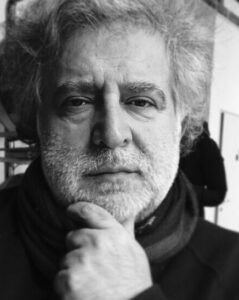This press release has been published by the Pasargad Heritage Foundation to the Personalities of the Year for their vision and efforts to preserve the national, cultural, historical, and natural heritage of Iran that also belongs to all humanity. Recipient of Nowruz Award of Pasargad Heritage Foundation, year 1402 Iranian Calendar (2023)
Recipient of Nowruz Award of Pasargad Heritage Foundation, year 1402 Iranian Calendar (2023)
In the field of Cultural Heritage.
Mr. Armin Langroudi is an author, researcher, and historian and is the recipient of the Nowruz Award in the field of cultural heritage for his achievements as outlined below:
-
- For his many years of research on the history of religions and especially interrelationship between history of Iran and those religions,
-
- For his extensive writings which include many articles and four unique books related to the history and culture of Iran and other countries, including the book “Why did we become Muslims”, the first book in Persian language that challenges hadiths and “Islamic history”,
-
- For his courage to reveal the historical facts of different religions, instead of deceptive stories and legends, in the framework of scientific historiography,
-
- For his tireless, realistic, measured and unbiased exploration of the history and culture of Iran which has led to many significant areas of research and debates,
-
- For his rare book titled “Who are we and what are the Iranians’ religions” which is a detailed and documented research book about the historical and cultural roots of Iranians.
Biography of Armin Langroudi
Armin Langroudi was born in 1962 (1341 on the Iranian calendar) in Tehran. His family’s roots go back to the city of Langarud. Langarud, is a city and capital of Langarud County, in Gilan Province in Iran.
After completing high school in Tehran, he left Iran for Europe and studied computer science and management. However, he has been continuously engaged in fields of philosophy and history of religions
The beginning of Armin Langroudi’s political life goes back to the beginning of the 1979 (1357 on the Iranian calendar) revolution. Like some of his peers, he was influenced by Marxist ideology at the time and in opposition to the rise of the theocracy, but soon separated himself from that way of thinking and independently researched the philosophy and history of this ideology. Langroudi has a close relationship with some researchers at the “Anara” group (research institute on the early history of Islam and the Qur’an) from the University of Saarland, Germany and his scientific and political articles and works have been published both in German and Persian.
Apart from dozens of historical-political articles and writings, Langroudi has published four books in Persian about the origins and nature of religions. Langroudi is also the Persian translator of Papperlapapp’s bilingual quarterly. It has been published in German and in 11 other languages including Farsi. This quarterly magazine for kindergarten and primary school children is published four times a year.
Armin Langroudi’s books in the order of their publication are:
“How did we become Muslims?” about the origin of Islam in Iran, 316 pages, Forough Publications in Cologne
“Apostasy in early Christianity and its role in the emergence and spread of Islam”, 154 pages, Forough Publications in Cologne, Germany.
“And God created man in his own likeness”, 435 pages, Forough Publications in Cologne, Germany.
“Who are we and what are the Iranian religions”, 435 pages, Forough Publications in Cologne, Germany.
Langroudi is currently writing an essay on the concept of “time” in ancient Eastern religions, Greek philosophy, and modern physics and philosophy.
*****
*****















